#Robert Montgomery Presents
Text
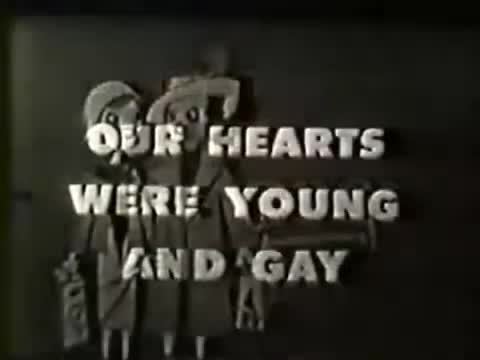
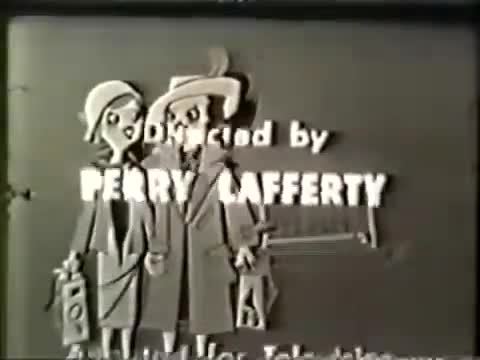
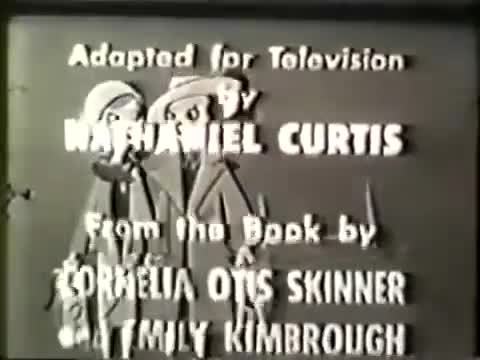
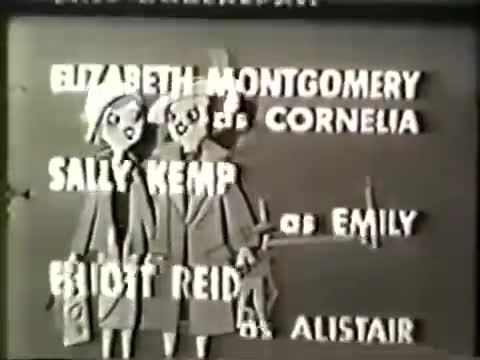
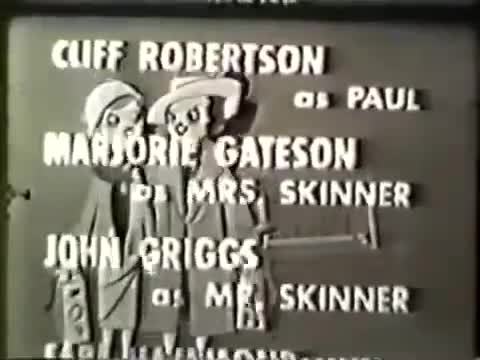
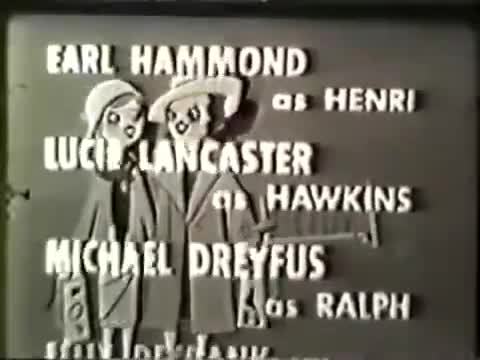
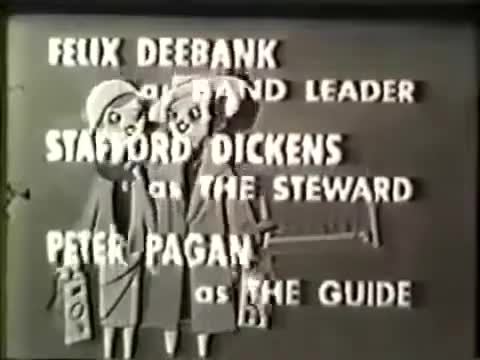
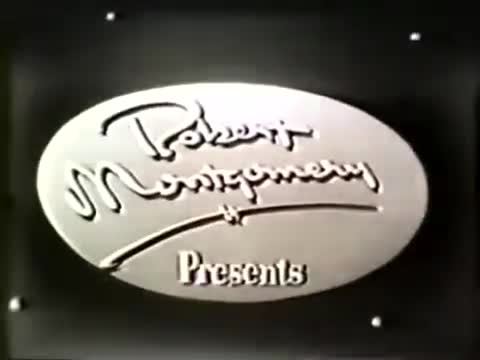
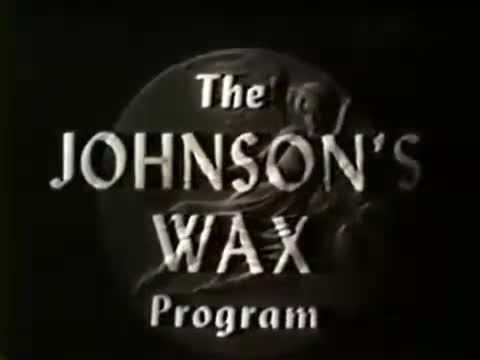
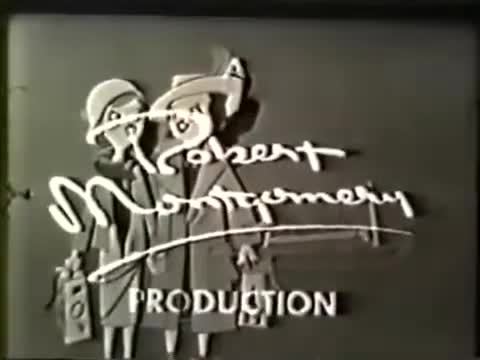

From the Golden Age of Television
Our Hearts Were Young and Gay - NBC - February 15, 1954
A presentation of "Robert Montgomery Presents" "The Johnson's Wax Program" Season 5 Episode 25
Drama
Running Time: 60 minutes
Hosted by Robert Montgomery.
Stars:
Elizabeth Montgomery as Cornelia Otis Skinner
Sally Kemp as Emily Kimbrough
Elliott Reid as Alistar Cochran
Cliff Robertson as Paul Smith
Marjorie Gateson as Mrs. Skinner (Maud Durbin)
John Griggs as Mr. Otis Skinner
Earl Hammond as Henri
Lucie Lancastor as Hawkins
Michael Dreyfuss as Ralph
Felix Deebank as Band Leader
Stafford Dickens as The Steward
Peter Pagan as The Guide
#Our Hearts Were Young and Gay#TV#Robert Montgomery Presents#Drama#1954#1950's#Robert Montgomery#Elizabeth Montgomery#Sally Kemp#Elliott Reid#Cliff Robertson
4 notes
·
View notes
Text



Dramatic anthology TV series,“Robert Montgomery Presents” debuted on NBC on January 30, 1950 and ran for eight seasons.
Terrific actors appeared on the popular show including regular, Montgomery’s daughter Elizabeth.
aka “ Your Lucky Strike Theatre” #OnThisDay
57 notes
·
View notes
Text
Two of a Kind || Dazai x Reader Part 4: Woven Threads

Story Summary: The search for your brother has led you into conflict between the Armed Detective Agency of Yokohama and the Guild. Fitzgerald keeps you involuntarily, that is until you finally find your chance of escape. Will you find strength within the ADA, or will you only become more astray?
Word Count: 2.2k
Characters Featured: F. Scott Fitzgerald, Atsushi Nakajima, Lucy Montgomery
Warnings: afab!reader, slowburn, plot heavy to build up romance, very tiny small mention of Atsushi's abuse, lmk if I happened to miss anything please!
Tag List: @decaf-nosebleed @isa-ghost @xakumi @bunchofdoodlesinspace
A/N: If you want to be added to the tag list, feel free to let me know! Psssst, guess who's finally showing up next chapter now that we're done building the beginning plot? :)
.・。.・゜✭・.・✫・゜・。.
Time was a blur as you ran. Your lungs were on fire and your feet slapped against the hard pavement in a steady rhythm. You ignored the curious stares that followed you, and you attempted to stay close to the docks. You didn’t know where to go. You were in an unfamiliar city in a foreign country. You had nobody to rely on, and every thought swarming through your head about the Guild and the Port Mafia was only creating more anxiety. You had to leave, and you didn’t know how. You wish you had just found Roberte already. There was no calling for help unless you went through the Guild, and you did not want to resort to crawling back into Fitzgerald’s clutches. Your freedom was right in front of you, and you were going to steal it back.
You were forced to catch your breath, the air in your chest circulating in and out in desperate wheezes as you leaned against the nearest wall. You doubled over and closed your eyes as you focused on taking a slow, deep inhale and letting it out slowly. You repeated this several times, and not only did it help with feeling like you were no longer suffocating, but also helped in regaining awareness of your situation.
The relaxing silence was interrupted with a small commotion that sounded close. You instinctively made yourself small and proceeded with silent footsteps to investigate. The voice inside your head screamed at you to keep running and find a ship that was heading back to America, but your curiosity was winning.
As you turned one of the corners, you gasped before slapping a hand over your mouth to keep quiet. You silently prayed while you hid yourself behind the corner of the building again, hoping that Fitzgerald did not spot you. With no footsteps hurrying toward you, you gave a sigh of relief and cautiously allowed yourself to evaluate the scene.
Your eyes were stuck on one individual, and it wasn’t Fitzgerald. Despite your captor and Melville being present, the boy with white choppy hair that you thought dead was standing right before your eyes. He was accompanied by a small girl in a red kimono, her black hair pulled into two twin-tails. You remember seeing a glimpse of her when you had landed with Hawthorne and the others, but she had seemingly run off while no one noticed.
The growing burning sensation in your chest was not from lack of oxygen this time, and it was with surprise that you recognized it as anger. You noticed that the boy was already disheveled and bleeding, whether it was by Fitzgerald’s hands or not, it didn’t matter. You decided not to make the same mistake again.
A brave step out was met with the sight of the boy’s hand turning into the claws of a tiger, but before he could attack the two Guild members, a bullet shot across and met with his head to render him unconscious. The girl had started to reveal her short sword before a bullet contacted her hand, leaving it instantaneously bleeding and bruised red. You realized with horror just who was shooting these bullets. Though they were made of rubber, only one person could be so skilled.
The knowing laugh made you nauseated, your eyes finally looking at Fitzgerald as he smiled at you. Your freedom was a sick joke. You were never unshackled, and what Fitzgerald said next only confirmed it.
“Miss Louisa’s strategies are always so perfect.”
Your dreadful world turned black after you heard the next and final shot.
⫘⫘⫘⫘⫘⫘⫘⫘⫘⫘
Waking up was a chore for once. The adrenaline in your body had finally worn off, and the soreness in your muscles made you want to cry out pathetically. You nearly sobbed for another reason. Your surroundings were all too familiar. You were back on the Moby Dick; in the very same room you were previously using. The frustrated scream that was torn from your chest shocked you, but you couldn’t stop it. It felt like minutes before it finally cut off with choppy breath, slamming your fist against one of the walls. You would never escape.
You stood up carefully and shuffled over to the nearest corner, hugging your knees to your chest and hiding your face. Later, the door opened and the voice of a boy yelling to be let go entered your ears. You were startled enough to finally look up when he attempted to hit the walls and look out the compact window. At the same time, he noticed you. It was the tiger boy.
“I have to get out of here. Yokohama is in danger,” he said weakly, realizing his defeat being encased in the room; just as you already had for months. You shook your head quietly at him, and it pained you to see him look forlorn and broken.
“I’m afraid that this aircraft is meant to keep us inside,” you murmured in a horrible attempt at comfort. “It is good to at least see you alive, minus the circumstances.”
It was quiet for a long moment, and you nearly assumed he wouldn’t remember you before you felt a presence beside you. Your eyes flickered to the left of where you were sitting to see him joined with you on the floor. This close, you saw more details of him. Whoever had cut his bangs must have been scared by something while they had the scissors in their hands. Out of all the hair that was white, there was one strip of it that was black. His eyes still reminded you of the late summer sunsets, warm and innocent as they watched you.
“I’m Atsushi,” he introduced himself with a gentle smile. Such a warm welcome nearly brought tears to your eyes, and you looked away before he could see. You saw the way his smile began to fade at your reaction, but you offered your own name quietly and the smile returned.
“I’ve never wanted to hurt people,” you began to explain. “I simply ended up in the wrong hands, and now I am paying the price for my own trusting nature. I haven’t had free will for months. I’ve been forced to follow and stay silent unless spoken to. It’s safer that way. I came here to reunite with my brother, but instead I am finding myself a bird in a luxurious cage and my ability to be used until I am disposed of.”
Atsushi’s sympathetic expression lifted a weight off your shoulders. For the first time in a long while, you felt heard and seen by someone who felt more like a friend than a superior. The words you had spoken were probably the most you had heard from yourself in several weeks, and it certainly made you emotional. You felt on the verge of finally breaking, but you wouldn’t leave Atsushi to deal with that uncomfortable situation. You pushed back the threat of tears pricking at your eyes and focused on him.
“I didn’t even know you were the weretiger Lord Francis was looking for,” you mentioned with a clear grimace. “That’s how uninvolved I am. I have only heard mentions of you in passing between other Guild members, and I always wondered what was so special that he placed a bounty on your head. I was the one that hesitated to hurt you in that fight by the fountain; the one with the water ability. I can take on other appearances, and with them their abilities if the person harbors one.”
Something in your words made Atsushi frown, and for a moment you were terrified that you had offended him, or worse scared him with the mention of what you could do. The one person who you were managing to befriend, and you could easily tarnish it and have it pulled out of your grasp. Thankfully, he reassured you with his reply.
“I would like to thank you for sparing me that day. Many say that hesitation is weak, but you have a sense of mercy. I could see in your eyes,” he stated with a little smile “As for Fitzgerald, he said something about me being a key of some sort. A ‘tiger beetle.’ I have no idea what he’s talking about,” he recalled. You nodded, not out of understanding, but to let Atsushi know that he had your attention.
“You said that Yokohama was in danger?” you timidly questioned. You felt the urge to hug the poor boy as he was pulled back into the current dilemma, his expression changing from confusion to the dawning apprehension that his city was being threatened.
“Fitzgerald plans to burn it all to the ground, the Agency and the Port Mafia along with it. He said it was some sort of incineration operation. I have to warn everyone. I have to get the doll to Dazai.”
You were about to interject his panicked rambling when you both were interrupted by another outside source.
“You two sure do look cozy in there. I just came to check on you when I was taking out the garbage,” Lucy said, her tone dripping with smugness. Her voice prompted Atsushi to leave your side and attempt to convince her to let him out. Normally you would be comforted by Lucy’s presence, but your thoughts went elsewhere while they conversed. You were able to pick up on their conversation when they both showed their burn scars from a hot iron poker. Your heart ached with sympathy for each of them, and you saw the gears of similarity clicking together and turning.
One moment you were in the locked room, but in the blink of an eye you found yourself with Atsushi in Lucy’s room. Her ability allowed her to create a personal space for her and the giant ragdoll called Anne, time and space warping to create such an idea. It had been the first time she had allowed you in, and you could see why she would want to use it as her own escape where no one could reach her. It was then you noticed that in one of her hands was the doll that Atsushi must have referenced earlier.
“Dazai only needs to be able to touch the doll in order to stop the curse,” he guaranteed Lucy when she said it would be too late.
“We are high in the air and unlikely to come down any time soon. What are you planning—?" you began to question, but the look on Atsushi’s face told you and Lucy that he would risk his own life to get the doll to whoever Dazai was.
“Atsushi, you can’t—” you started while shaking your head. “You’ll die.”
There was a moment of silence before Lucy spoke. “So, if you’re serious, then you’ll probably get shot and killed in the air or get cut up by the mad men down there. You know that already, and you’re still going to do it.”
“There was an old book I read back at the orphanage,” Atsushi replied. “One of the passages stood out to me. It read, ‘I’ve never regretted any of the things I’ve done. I’ve only regretted the things that I didn’t do.’”
Atsushi was pulled out of his thoughts when Anne loomed over him to offer a parachute bag. The boy’s sunset eyes observed it in confusion before Lucy explained that she had kept it in case she needed to escape.
“I only have one, so if you would like to stay with me in Anne’s room,” she offered to you, but you watched the surprise take over her expression further when you shook your head.
“I can’t stay here any longer, Lucy. I have to find Roberte even if he isn’t here, and I realize how much of my life I’m beginning to miss being trapped in this aircraft forever in Fitzgerald’s hands. I’ll come back for you.” You offered her a smile which she returned.
“We both will,” Atsushi added with determination.
“How will you get down? I only have one parachute and it’s Atsushi’s,” Lucy inquired with a frown. “You’ll die instead of him.”
“Don’t forget why I was captured to begin with. I have several cards up my sleeve,” you answered.
The door in Anne’s Room opened to show the exterior of the Moby Dick, the wind coursing through your hair. Your body tensed at the idea of how high up in the atmosphere you were, the clouds just below you and the city of Yokohama so small beyond them. You could see pillars of smoke from several directions, a heavy feeling in your stomach as you realized Fitzgerald already put his plan in motion.
You took a deep breath and focused on using your ability. You took on the Change that you used to escape the Zelda when it was set aflame with explosions, the wings protruding from your back and your blonde hair glowing orange in the setting sun. Your eyes didn’t have to adjust as harshly as before once the Change was completed.
You barely registered having time to brace yourself for the big drop down as Atsushi gave you a determined nod, then bravely jumped without hesitation. You glanced back at Lucy one last time, nodding your thanks before leaping after Atsushi. You were airborne.
#dazai osamu#bungou stray dogs#bsd#bungo stray dogs#bsd dazai osamu#dazai osamu x reader#dazai x reader#bsd x reader#bsd x female reader#dazai imagines#dazai x y/n
28 notes
·
View notes
Text


Brigadier General Derek Mills-Roberts (on the left), a British commando with the 1st Commando Brigade, accepted the surrender of German Luftwaffe Field Marshal Erhard Milch (on the right) on 4 May, 1945, apprehending Milch on the Baltic Coast. Milch handed over his staff-of-office, a command baton, to the British officer.
Mills-Roberts had been present for the liberation of Bergen-Belsen concentration camp. Horrified and disgusted by the vulgarities of the concentration camp, Mill-Roberts demanded an explanation of what he saw there from the field marshal. Milch was the son of a Jewish father and was considered 'mixed-race' under Nazi racial laws; he was the only field marshal in the Nazi military of any Jewish descent.
Milch's response was, "These people are not human beings like you or I."
Mills-Robert's response was to beat Milch over the head with Milch's own baton until it broke, fracturing Milch's skull.
The next day, Mills-Roberts reported to Field Marshal Bernard Montgomery and apologised for losing his temper with a senior German prisoner. It broke the laws of war, despite what Milch had said. Montgomery merely covered his head and joked, "I hear you've got a thing for field marshals!" Nothing more was said about the incident.
Milch was convicted of war crimes and crimes against humanity at the Nuremberg Trials. Sentenced to life imprisonment in 1947, it was commuted to 15 years in 1951, and he was paroled in 1954 having been imprisoned for only seven years.
52 notes
·
View notes
Text
#6: The Lady in the Lake (1946)

I’ll be honest, the best part of this movie is Audrey Totter. There’s a reason she was one of the queens of B movies in the 1940s—she’s just incredible. She’s cold and calculating and absolutely gorgeous.
A lot of things about this movie are a little hard to judge because the cinematography is frankly just that distracting. Robert Montgomery invented first-person POV camera work for this movie and it’s a very impressive accomplishment. It also just takes over the whole thing.
The plot kind of follows the book, though it simplified the actual lake plot, which is kind of hilarious, and all of the romance between Marlowe and Adrienne Fromsett is completely made up.
Montgomery is a so-so Marlowe, he’s not the worst one to do it but he’s far from the best either. Again, I think a big part of that is that the cinematography keeps him so disconnected from the audience that you just don’t get to know him well and then his doing double-duty as the director kept him busy. The star of the film is really Totter, which is probably just as well.
Overall movie score: 3.5/5, mostly for Audrey Totter and the innovation in cinematography
Marlowe score: 3/5, Montgomery isn't bad, he just doesn't quite feel present; ironically his focus on the first-person POV made me feel detached from him as a character
Perry Mason score: 3/5, it's only Audrey Totter but she's just so incredible that she's worth 3 points all by herself
For a reminder of why I started this series and how I’m rating these movies, you can check out my master Marlowe post. I’ll be posting my reviews/rankings of the remaining Marlowe movies using the tag #Marlowe movies so if you’re interested, follow along!
#marlowe movies#philip marlowe#the lady in the lake#robert montgomery#audrey totter#this really isn't a bad movie#and i would recommend watching it#the camera work may be a bit distracting but it's also incredibly well done#and wild to think about how innovative it was at the time#i think modern audiences take so much for granted these days#we forget that movies were still relatively young in the 1940s#so much of what directors did was made up on the spot#montgomery really was a revolutionary in this film
8 notes
·
View notes
Note
hcs + josie
give me a character and i’ll give you 10 headcanons ; josephine montgomery driscoll
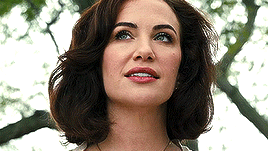
seu sonho de criança sempre foi morar em uma casa bem grande no meio do nada, com um jardim enorme, rodeado por florestas e um lago - ainda não realizou esse sonho, mas não é difícil achá-la procurando esse tipo de propriedade no google.
nunca imaginou que se tornaria uma escritora best seller - na verdade, ela é formada em administração e era gerente de uma empresa de tecnologia, escrevendo apenas por diversão e para si. foi só quando elias nasceu que ela viu uma possibilidade de seguir carreira com a escrita. quando pequeno, elias exigia que ela contasse a mesma história antes de dormir, e todos os dias josephine acrescentava ou mudava algo, para o deleite do pequeno.
josephine publica seus livros sob o nome "josie mont", e entre seus maiores sucessos estão os livros a historia secreta, nona casa e o impulso, este ultimo que gerou certa polemica ao ser lançado, pelo fato de ser mãe.
josie escreveu seu primeiro manuscrito em apenas três meses, e depois o jogou completamente no lixo - nem robert conseguiu ler. se questionava constantemente se aquilo seria o certo para a sua vida, e depois de se afastar do oficio por um tempo, voltou a escrever o que viria a ser seu primeiro livro publicado: rede de sussurros.
abriu uma caixa postal e todas as semanas vai lá retirar cartas e presentes deixado por seus fãs, e sempre acaba encontrando algumas coisas bizarras entre os presentes - certa vez recebeu um dente humano.
elias, cecilia e oliver são sua razão de viver. ser mãe nunca foi seu sonho de vida ou sua prioridade, mas depois que seus filhos nasceram, tudo mudou, e ter passado a trabalhar de casa só intensificou sua conexão com os pequenos. assim que a relação com robert começou a complicar, seu maior receio de conversar com o marido era por não saber como o resultado da conversa influenciaria nos filhos.
josephine odeia estar sozinha e odeia silencio. antes de ter os filhos, quando robert estava de plantão, costumava deixar o radio ligado bem alto, não importava o que estivesse passando, só para ter a sensação de que não estava sozinha em casa.
tinha a mania de entrar em livrarias e autografar seu livros em segredo - inclusive, já quase foi expulsa de uma, o atendente alegando que ela estava avariando os livros - felizmente, sua foto estampava a orelha do livro. depois desse acontecimento, sempre avisa antes de fazer isso.
ama estar ao ar livre, e sempre que pode, organiza acampamentos e picnics para a família toda. uma vez alugou um barco e decidiu que todos da família iriam aprender a pescar, mas o passeio não durou muito pois elias acabou ficando enjoado.
josie fez aulas de dança de salão desde quando era bem nova, e se considera até que decente na arte - não é boa o suficiente para ganhar competições, mas esse nunca foi seu objetivo, e sim exercitar o corpo e se divertir.
#( meti um bocado de livro famoso sim ein rs <3 )#( o ex sobrenome riscado eu sou filha de divorcio 😭 )#𝚊𝚜𝚔 𝚖𝚎𝚖𝚎 ; respondida.#𝚙𝚊𝚛𝚝𝚗𝚎𝚛 ; sadi.#𝚌𝚑𝚊𝚛𝚊𝚌𝚝𝚎𝚛 ; josephine montgomery.
17 notes
·
View notes
Text
Happy birthday darling I have no presents and fantasy cake but I hope I make you happy with everything I made like this edit right here with all of your pictures in it Shirley Jane Temple Black 1928-2014 April 23rd 1928-February 10th 2014 and special rest in peace to those who passed away Bishop Rance Allen, Conway Twitty, Loretta Lynn, Lisa Loring, Bob Saget, Betty White, Heather O'Rourke, Judith Barsi, baby Leroy, baby Peggy Montgomery, Peggy cartwright, Darla Jean Hood, Jean Darling, Peaches Jackson, Mary Ann Jackson, Dorothy DeBorba, Mary Kornman and Mildred Kornman, Kenny Rogers, Patsy Cline, Modest Petrovich Mussorgsky, Eazy-E, rest in peace Ana Ofelia Murguía December 31st 2023, Jim James Edward Jordan, Lucille Ricksen, Judy Garland, Margaret Hamilton and Terry and Pal, Eva Gabor, Geraldine Sue Page, Pat Buttram, Joe Flynn, Michael Gambon, Alan Rickman, Gene Wilder, Jack Albertson, Richard Belzer, Richard Harris, Bernard Fox, Raymond Burr, Perrette Pradier, Jeanette Nolan, Larry Clemmons, Bing Crosby, John Candy, John Heard, John Fiedler, Beate Hasenau, Billie Burke, Roberts Blossom, Billie Bird, Bill Erwin, Ralph Foody, Jack Haley, Ray Bolger, Bert Lahr, Frank Morgan, Jim Nabors and Frank Sutton, John Wayne, Clara Blandick,Charley Grapewin, Buddy Ebsen, Angelo Rossitto, Clarence Chesterfield Howerton, Bridgette Andersen, Dominique Dunne, Dana Plato, Robbie Coltrane, Lance Reddick, Betty Ann Bruno, Betty Tanner, Elizabeth Taylor, Helen McCrory, Ray Liotta and Tom Sizemore and Burt Reynolds, Zari Elmassian, Frank Cucksey, Vyacheslav Baranov, Vladimir Ferapontov, Carol Tevis, George Shephard Houghton, Irving S. Brecher, Richard Griffiths, Andy Griffith and Don Knotts, Joe Conley, Alan Arkin, Jerry Heller, Fred Willard, Mary Ellen Trainor, Morgan Woodward, Anna Lee and John Ingle, David Lewis, Ken Curtis, Ed Asner, James Caan, James Arness, Amanda Blake, Avicii, Jane Withers and Virginia Weidler, Milburn Stone, Natasha Richardson, Joanna Barnes, Cameron Boyce and Tyree Boyce, Cammack"Cammie"King, Denny Miller, Jane Adams, June Marlowe rest in heavenly peace to all of them actors and actresses this is Shirley Temple birthday edit of the year
2 notes
·
View notes
Text
My media this week (14-20 Jan 2024)
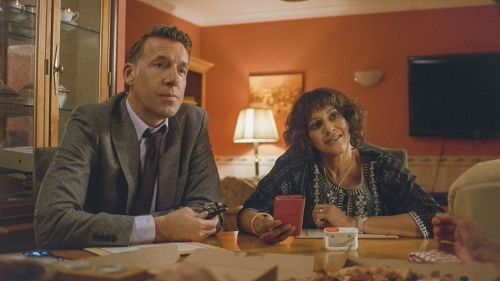

📚 STUFF I READ 📚
Death in Soho (Augusta Peel #1) (Emily Organ, author; Sarah Nichols, narrator) - acceptable cozy mystery set post-WWI. Perfectly cromulent and will probably read another when I'm craving an uncomplicated read. Did appreciate that Miss Peel is middle-aged, not an ingenue/flapper
Ever Since New York (AHM1121) - 94K, shrunkyclunks omegaverse - just a really satisfying omegaverse fic, loved these versions of them
Running on Air (eleventy7) - 74K, drarry - it's 8 yrs post-war, draco's been missing for 3 of them and harry's been assigned the cold case. There's driving and melancholy and eventually sorting out feelings and stuff
💖💖 +199K of shorter fic so shout out to these I really loved 💖💖
Quench (AidaRonan) - MCU: shrunkyclunks, 9K - reread, all time forever fave with possibly my fave description of thick steve: 'built like a mack truck made out of ribeye' (all the simile action in this fic is fantastic tbh)
This Light-Struck Country (TentacleParty) - The Witcher: eskel/oc (monster), 18K - some truly quality monsterfucking
sunrise supplications (liadan14) - The Old Guard: kaysanova, 12K - great modern AU enemies-to-lovers with a very clever spin on joe & nicky's canonical meeting
Slow Boat to China (Penguinjava) - A Charm of Magpies series (KJ Charles): Merrick & Lucien, 7K - wonderful vignette of the boat trip to china after lucien's horrible father banished them & the foundation of their relationship
📺 STUFF I WATCHED 📺
Brooklyn Nine-Nine - s8, e1-4
Dirty Laundry - s3, e10
D20: Fantasy High: Junior Year - "Summer Breakdown" (s21, e2)
D20: Adventuring Party - "Fs Get Defgrees" (s16, e2)
Mrs Sidhu Investigates - s1, e1-4
🎧 PODCASTS 🎧
⭐ Desert Island Discs - Greta Gerwig, writer and director
What Next: TBD - Is Your Car Tracking You?
Ologies with Alie Ward - Carcinology (CRABS) Part 1 with Adam Wall
Pop Culture Happy Hour - Our Emmys Recap
Switched on Pop - Soundalikes: Lil Nas X and Ariana Grande
⭐ The Sporkful - The Hidden Battle Over Grocery Store Shelves
99% Invisible #566 - Imitation Nation
Code Switch - The women who masterminded the Montgomery Bus Boycott
⭐ Films To Be Buried With - Joel Kim Booster
Just One Thing - Take Vitamin D
NPR's Book of the Day - 'The Golden Screen' chronicles the films that shaped the Asian American diaspora
Vibe Check - Wesley Morris, or Wesley Snipes?
Welcome to Night Vale - Bonus Ep: Riddle Guy
NPR's Book of the Day - 'The Frozen River' tells the fictionalized story of a real 18th century midwife
Sara & Cariad's Weirdos Book Club - Monsters: A Fan's Dilemma by Claire Dederer with Winnie M Li
Today, Explained - How the war in Gaza ends
99% Invisible - Power Broker #01: Robert Caro
Dear Prudence - I Spend Hours a Day Having Intense Romantic Daydreams. Help!
Endless Thread - Where's the Beef?
What Next: TBD - The Great British Library Hack
It's Been a Minute - The political power of white Evangelicals; plus, Biden and the Black church
Under the Influence with Terry O'Reilly - When Bad Commercials Become Cult Classics
Wait Wait… Don't Tell Me! - David Oyelowo
You're Dead to Me - The Bloomsbury Group
🎶 MUSIC 🎶
The Definitive Croce
Classic Bedtime Favorites
Presenting Lionel Richie
'80s Pop Party
Green Day
Presenting Gordon Lightfoot
Presenting Steely Dan
#sunday reading recap#bookgeekgrrl's reading habits#bookgeekgrrl's soundtracks#fanfic ftw#mrs sidhu investigates#dimension 20#fantasy high: junior year#green day#jim croce#gordon lightfoot#'80s music#steely dan#lionel richie#99% invisible podcast#vibe check podcast#you're dead to me podcast#endless thread podcast#films to be buried with podcast#switched on pop podcast#npr's code switch podcast#npr's pop culture happy hour podcast#ologies podcast#under the influence podcast#welcome to night vale#what next: tbd podcast#it's been a minute podcast#today‚ explained podcast#npr's book of the day podcast#wait wait... don't tell me!
3 notes
·
View notes
Text
Winter of Discontent
by Ancient Clay

Robert Ryman, Untitled, c. 1963, Oil on stretched sized linen canvas, 77 3/4 x 77 1/2 inches (197.5 x 196.8 cm)
In contemplating the exhibition ‘Manet/Degas,' I find a particular fondness for the distinctive purple walls employed, an appreciation further heightened by the nuanced array of tonal purples. My predilection for colored walls over the conventional white canvas for artistic presentations is grounded in a belief that while certain works may necessitate a white backdrop, the broader spectrum of art benefits from a colorful setting. Implicit biases have historically shaped art display norms, with affluent white patrons in Europe and America dictating the prevalence of white walls. The assertion that colored walls distract from the artwork is, in my view, a questionable rationale, suggesting that if a monochromatic backdrop proves distracting, perhaps the work itself lacks intrinsic engagement.
Black and white photography, I argue, flourishes against a backdrop of grey walls, surpassing the traditional white canvas. Notably, Black artists and curators often integrate colored or decorated walls into their exhibitions, a departure from the practices of their white counterparts. The resistance to colored walls in non-Black exhibitions seems rooted in the conservatism of a predominantly white demographic. While an exception can be made for certain exhibitions, such as those featuring Robert Ryman or achromes by Manzoni, the resistance to colored walls may also stem from a lack of familiarity and vision on the part of non-Black curators.
Addressing this lacuna, the incorporation of more Black curators, possessing a discerning eye and visionary acumen, could potentially alleviate the perceived challenges in selecting appropriate shades, tints, and tones for colored walls. It is noteworthy that resistance to this trend often emanates from the entrenched preferences of majority white individuals, whereas Black artists consistently demonstrate a superior grasp of color dynamics within their works.
This discourse prompts reflection on the misconception surrounding Greco-Roman statues, falsely presumed to be inherently marble-white rather than originally painted with vibrant hues that have since faded. Additionally, it underscores the divergence between artists who must consciously study color theory and those who organically navigate the realm of color within their cultural milieu.
Transitioning to the broader context of art criticism, I lament the current state of art writing, perceiving a decline marked by the marginalization of genuine whistleblowers and trailblazers. The resistance to embracing critical perspectives, particularly those espoused by Black individuals, is emblematic of a systemic bias. The art world, predominantly dominated by white cis men, remains resistant to Black criticality that seeks to propel discourse forward, often diluting its fervor when institutionalized.
Amidst a world grappling with interconnected genocides, I find myself positioned as a perceived "problem" within the art community for addressing anti-Blackness at its root rather than on a superficial level. The conversation is now being co-opted by those who, having weathered minimal losses, opportunistically seek to redirect the discourse while erasing the most vocal advocates between 2014-2023. This insidious shift, coupled with the selective memory of those who decry the absence of action, raises questions about the authenticity of their newfound concern.
The call for riots, emanating from quarters insulated from the harsh realities faced by marginalized communities, is met with skepticism. The inability to crowdfund material support for Black individuals and the absence of sustained systems for striking and material aid render such calls impractical. The historical success of movements like the Montgomery bus boycott, characterized by robust support systems, stands in stark contrast to contemporary slogans lacking substantive actions.
Moreover, the art world's apathy towards cancelations of exhibitions that address anti-Blackness and settler colonial violence underscores the industry's inertia in effecting meaningful change. The myopic focus on petit bourgeoisie and bourgeois strikers, at the expense of those on the margins, perpetuates a skewed narrative that fails to address the root issues. As I finish my applications for the year and day job responsibilities persist, I am compelled to navigate this landscape with a critical eye, ever mindful of the pressing global issues that demand our collective attention.
5 notes
·
View notes
Text
the rude roommate
There’s a presence following us everywhere. Insinuating itself into our lives, as we enjoy movies, TV shows and music. This rude roommate not only lives with us, but follows us to school, to work and everywhere else that we go, constantly blathering to wear us down. Posing as an indulgent pal, it offers tasty treats, with “go on, you’re worth it!” encouragements. Then, morphing into the concerned friend, it chides us “you’re getting some love handles there, buddy!” and pushes snake oil for that too. Yes, I’m talking about the shifting personas of ADVERTISING.

You don’t truly notice the ever-present & manipulative jibber jabber of advertising till it’s not a part of your life. It’s like cigarette smoking in this. I was raised by on-again-off-again smokers, and for many years worked in offices permeated by ever present cigarette smoke. Soaking in it everywhere for my entire life, it was only upon moving to California (where it’d just been banned) that I truly became aware of smoking. After living smoke-free, I couldn’t believe the stench when visiting places that still allowed it in communal spaces. My own hair & clothes reeked of it, even though I didn’t smoke myself. Bleurgh!
Likewise, after soaking in advertising my entire life, I’ve only recently lived in a (relatively) ad-free bubble, enjoying media streaming services at home for the last few years. We just watched a movie in a cinema for the first time since 2019. Tickets were almost 20 dollars each for comfortable reserved seating in a beautiful theatre. Then we had to endure 30 minutes of constant advertising blather before the film. Not movie trailers mind you, but ads for clothes, soft drinks and so on. After living ad-free, this was excruciating, and eye-opening. Absence had not made my heart grow fonder. Quite the opposite.
The deal used to be that we tolerated the buzz of ads - like blowflies at a picnic - in exchange for free movies & music (on radio & TV). Nowadays, I pay extra for the ad-free option with entertainment media. Which is a blackmail shakedown - “Pay us, or you have to watch another incontinence commercial” - but at least I understand the terms of that arrangement. I don’t understand (or accept) any deal where I pay AND get ads too (which is why I didn’t have cable TV for very long). If theatres want us to come back en masse after the stay-at-home-years of covid, then making the experience special is key. For me, paying premium prices to watch Madison Avenue Punch & Judy shows is an absolute no no.
Advertising is RUDE. The constant interruptions are simply annoying, but the purpose of the messages is insidious. In our real lives we are wary of people who constantly broadcast their own PR, because they’re trying to manipulate our perceptions of them. We must be on extra high alert for those who tell us what we are, because they’re trying to manipulate our own perceptions of ourselves.These are the goals of advertising’s trillion dollar industry. It is a nonstop psyop, fanning our hopes and inflaming our insecurities for profit.
“The spectacle of advertising creates images of false beauty so suave and so impossible to attain that you will hurt inside and never even know where the hurt comes from.”
- Robert Montgomery
Ever since humans first gathered around fires and hearths, we’ve related to each other via stories. Stories are ‘lies’, in that many of them are 100% made up, but we know that and sharing them is fun. Besides, there may actually be a truth within the story. A parable. However, the human love of stories makes us vulnerable to manipulation by stories too. This is well known on Madison Avenue. Advertising subverts the parable, where the parable’s ‘moral’ has been substituted with a plug for Brand-X.
It used to be that everyone was served the exact same ads at the same time, but we now live in the era of micro-targeted advertising. After sneakily looking through our private data, the rude roommate can now identify & hammer on each of our specific ‘problem areas’. Despite my attempts at internet ad-blocking, the rude roommate has a fairly accurate demographic profile of me, and websites I visit now display ads of male middle aged losers, worried about their dicks, bald spots, love handles & baggy eyes. The rude roommate has custom-curated these parables just for moi. If advertising was indeed your roommate, an actual person, they’d be the worst person you know. A passive aggressive, gaslighting master manipulator, and the last person you’d want constantly whispering in your ear.
“People are taking the piss out of you everyday. They butt into your life, take a cheap shot at you and then disappear. They leer at you from tall buildings and make you feel small. — They have access to the most sophisticated technology the world has ever seen and they bully you with it. They are The Advertisers and they are laughing at you.”
- Banksy
“Narrative” has become a buzz word, and Hollywood folk (including story artists) now give story seminars to big companies. Wall Street, Langley, & Silicon Valley understand the appeal of storytelling, and Washington & Whitehall both use Spin Doctors to “get ahead of the story" and "control the narrative". The NSA & CIA know a little about narrative manipulation too, and even they are wary of internet advertising propaganda, and use ad-blocking software. Takes one to know one, right? Speaking of that, my own growing allergy to advertising is surely punishment for years of participation in the mass hypnosis. Yes, at one time I enabled the rude roommate, by animating parables that enticed kids to eat sugar bombs for breakfast..
Mea culpa!
Given that advertising so often subverts artforms, artists have been known to return the favour. B.U.G.A.U.P. was a collective of Sydney graffiti artists active in the 1970s/80s who specifically targeted advertising, very active when I lived in that city. Their special brandalism defaced advertising billboards to subvert the intended message of the ad, revealing the hidden truth of the unhealthy product itself. These wittily-defaced billboards on commuter routes in Sydney were talking points at office coffee pots & tea urns each morning.
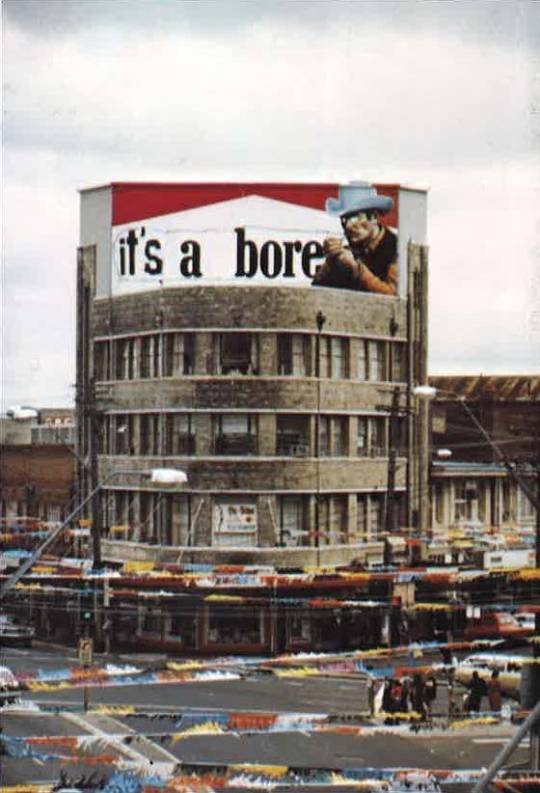

Their movement spread to other cities in Australia and even to other countries (I often wondered whether Banksy knew about them) and B.U.G.A.U.P. activism ultimately led to a ban on cigarette advertising in Australia in 1994. Advertising’s corrupted parables RE-made into truth telling parables again. Utterly brilliant.
PS: Full BANKSY QUOTE on advertising (as illustrated by Gavin Aung Than).
From www.James-Baker.com
8 notes
·
View notes
Text

Virginia Cathryn "Gena" Rowlands (/ˈdʒɛnə/; June 19, 1930 – August 14, 2024) Actress whose career in film, stage, and television spanned nearly seven decades. A four-time Emmy and two-time Golden Globe winner, she collaborated with her actor-director husband John Cassavetes in ten films.
Rowlands costarred with Paul Stewart in the 26-episode syndicated TV series Top Secret (1954–55). She guest-starred on such anthology television series as Robert Montgomery Presents, Armstrong Circle Theatre, Studio One, Appointment with Adventure, The United States Steel Hour, and Goodyear Television Playhouse, all in 1955. In 1959, Rowlands appeared in the Western series Laramie, alongside her husband John Cassavetes in the detective series Johnny Staccato, and in the Western series Riverboat, starring Darren McGavin. In 1961, she appeared in the adventure series The Islanders, set in the South Pacific, and in Target: The Corruptors!, starring Stephen McNally. She guest-starred in The Lloyd Bridges Show, the detective series 77 Sunset Strip, Kraft Suspense Theatre, the Westerns Bonanza and The Virginian, and Breaking Point, all in 1963. In 1964, she guest-starred in the medical drama Dr. Kildare and in two episodes of Burke's Law. She appeared in four episodes of Alfred Hitchcock Presents, three of which were after the series had been renamed The Alfred Hitchcock Hour. In 1967, she was cast as socialite Adrienne Van Leyden in the prime-time ABC soap opera Peyton Place.
In 1985, Rowlands played the mother in the critically acclaimed made-for-TV movie An Early Frost. She won an Emmy for her portrayal of former First Lady of the United States Betty Ford in the 1987 made-for-TV movie The Betty Ford Story
In 2002, Rowlands appeared in Mira Nair's HBO movie Hysterical Blindness, for which she won her third Emmy. Next year she appeared as Mrs. Hellman in an episode from the third season of Numb3rs. She played a Nazi survivor whose whole family was killed. The family owned a painting that the Nazis confiscated. Later on the painting reappeared. The new owner lent the painting to an art gallery in Los Angeles but while on display it was stolen. FBI. agent Don Eppes, played by Rob Morrow, tries to figure out what really happened.
In 2009, she appeared on an episode of Monk ("Mr. Monk and the Lady Next Door"). On March 2, 2010, she appeared on an episode of NCIS as lead character Leroy Jethro Gibbs's former mother-in-law, who is embroiled in a murder investigation. (Wikipedia)
IMDb Listing
#Gena Rowlands#TV#Obit#Obituary#O2024#Johnny Staccato#The Betty Ford Story#Hysterical Blindness#Peyton Place#An Early Frost
7 notes
·
View notes
Text


Angela Lansbury and Robert Montgomery in “The Citadel,” 1950 episode of “Robert Montgomery Presents.”
28 notes
·
View notes
Text
Mar. 27—A contractor convicted after he took money for home repairs from people after the 2019 Memorial Day tornadoes but did not do the work is in custody on unrelated charges.
Robert Tracy Greene, 56, of St. Paris on Thursday was named a most wanted suspect by Miami Valley Crime Stoppers for allegedly violating his probation. He was arrested by the Clark County Sheriff's Office and booked Friday night into the Clark County Jail for three traffic cases filed last year in Clark County Municipal Court, records show.
Greene was charged in February 2020 with 20 felony and two misdemeanor counts of theft involving 10 victims in Dayton and Trotwood. He was sentenced in November 2022 to up to five years of community control following his conviction on multiple theft counts and ordered to pay restitution to the victims he scammed, according to Montgomery County Common Pleas Court records.
He now faces five years in prison, according to the Crime Stoppers alert.
"On Feb. 13, 2023, the probation officer has presented to the court that the whereabouts of the defendant have been unknown since Jan. 31, 2023. Wherefore, the court finds the defendant is an absconder and orders that the period of time during defendant's absence from the jurisdiction of the division of criminal justice services of this court shall not apply as against the community control period herein," the order signed by Judge Timothy O'Connell stated.
Ohio Attorney General Dave Yost filed a lawsuit in February 2021 against Greene for exploiting homeowners following the tornado outbreak.
The lawsuit accused Greene, through his business TK Home Improvement LLC, of soliciting homeowners whose property was damaged and taking nearly $100,000 in payments between May 2019 and February 2020 but performing shoddy work or no work at all, according to complaints received by Yost's consumer protection section.
The Dayton Daily News first revealed the accusations against Greene and another local home improvement contractor in an investigation into complaints from tornado victims that unscrupulous contractors were delaying rebuilding from the 2019 tornadoes.
In 2019, Greene told the Dayton Daily News that he intended to finish the work on the tornado-damaged properties but couldn't because of open warrants, and that he intended to turn himself in. At that time, he had two warrants out for his arrest. He has been convicted of theft three times for contractor-related accusations: twice in 2012 and once in 2013.
The attorney who represented Greene in his criminal cases in Montgomery County declined to comment.
7 notes
·
View notes
Text
Against All Odds
Part 571
McCoy
Robbie appeared to be relaxing as they moved around the pool table, the two girls continuing to out shoot them.
When Jim and Spock arrived and said they were all needed by Pike, McCoy saw the concern cross everyone’s faces. He grabbed Scotty’s hand as they followed Jim and Spock.
Anxiety radiated from his fiancé and McCoy realized he was feeling the same. What did Pike want with all of them? They’d know soon enough.
The headmaster was waiting outside his office and ushered them inside.
“Why do you need all of us?” McCoy asked when they had been settled at the conference table on the far side of Pike’s office.
“The trials are finally beginning,” Pike began. “Sural and his fellow Romulans. You all played a part. Your statements were given to Captain Paris and Starfleet.”
“When are they starting?” Uhura asked.
“Monday.”
“They have our statements,” Sulu said. “They aren’t going to need us.”
“We have exams,” Jaylah spoke up.
“Your statements helped bring this trial about. Now they will need you to testify to what happened and your part in it.”
“Where are they having it? Do they expect us to be present?” Christine asked.
“I know this is a lot to ask of all of you, especially with exams this next week. The trial is being held on Earth. Vulcan was proposed, but the Romulans objected,” Pike said.
A soft noise came from Spock’s place at the table, but his expression remained unchanged.
“But we can’t—” Chekov began.
“You won’t. I haven’t finished,” Pike said gently. “Starfleet is sending a crew. Your testimony will be delivered from here. Everything needed will come with the crew that is sent. You will be excused from classes when it is your turn and your exams will not be interrupted. I have been adamant about that.”
Many sets of eyes looked at each other.
“What will happen to them?” McCoy asked.
“Most likely a penal colony,” Pike said quietly. “I wanted you all to know this was coming so you wouldn’t be surprised. I’m very sorry that it is beginning this week when things may already seem so stressful.”
“Do we have to give our testimony alone?” Scotty asked. McCoy heard the waiver in his voice.
“Most likely,” Pike said. “There will be Fleet personnel to run the equipment and video link, but you will each be here one at a time.”
McCoy gave Scotty’s hand a squeeze. He’d do what he could to help Scotty. They had been allowed to tell their story to Captain Paris together. Couldn’t they do the same?
“Any more questions?” Pike asked.
A few more questions and answers and Pike let them go.
“Leonard and Montgomery? Robert? Could you stay a moment more please?”
McCoy exchanged a look with Scotty and they sat back down at the table. Pike walked behind everyone else to close the door, then returned.
“Sir?” Robbie asked.
“When this trial of the Romulans is over they will move on to Khan’s.”
“Oh.” The sound came simultaneously from the brothers.
“It is expected to begin at the start of the new year.”
“And will we have to go to that or give our statements from here?” McCoy asked.
“I’m not sure yet,” Pike admitted. “But it is coming up.”
“What about the scientists?” Scotty asked. “The King said he’d help Khan get justice.”
“That would be David’s arena. I’m not sure when that is to begin. They may still be evidence gathering.”
McCoy sat on his bed watching Scotty nervously move around the room. They had returned to their room when they’d finally left Pike’s office. Scotty’s hand flittered over something on his desk and moved on quickly.
“C’mere,” McCoy finally said. He reached out for Scotty.
After a moment's hesitation Scotty sat down beside him.
“I don’t want to go through it again,” he said tightly, burying his face against McCoy’s shoulder.
“Neither do I darlin’,” McCoy replied. “But to get everything close to what we want, we’ve gotta get it done.”
He wrapped his arms around Scotty and pulled him backwards with himself. Stretched out, McCoy reached a hand up and stroked through his fiancés hair.
“We’ll get through it leannan, just like we keep doing.”
Part 572
Scotty
He was all alone in a dark room. There was a huge screen in front of him and he could see Sural and the other Romulans who had taken Leonard and him. Sural was grinning in a self-confident way. He seemed to be sure to win this trial.
"Mr. Scott, what are you accusing my client of?"
He opened his mouth to say something, but no word left his mouth.
Scotty looked around. Leonard wasn't there. Where was Leonard? He needed Leonard!
His breathing got faster and he heard the voice of Sural's lawyer once again.
"Mr. Scott! Answer my questions!"
Eventually he managed to stammer a reply.
"I... I... Sural... he... kidnapped us. He... he shot at me. He..."
"I can't hear you, Mr. Scott. What did you say?"
The lawyer moved one hand to the back of his ear, showing that he didn't hear a thing.
"I..."
"Louder!"
Scotty shook his head, helplessly. He couldn't talk any louder. It was impossible.
"Your Honor, I honestly doubt that this testimony can be used against my client. This boy can't even tell us what happened."
"No, no... I..."
Tears streamed down Scotty's face. He had to say something. He had to stop this!
"Leonard... I... I need Leonard..."
His voice grew even quieter.
"Mr. Scott, answer the questions please," the judge said to him and Scotty tried over and over again, but it just didn't work.
Panic gripped his heart as he looked at Sural's smile which was growing even wider.
That Romulan spy had kidnapped them! He had hurt them! He had destroyed their lives!
"Mr. Scott!"
So many voices called out his name, asked various questions. But Scotty just covered his ears with his hands, squeezing his eyes shut.
"No... no... please... stop."
He needed them to be quiet. He couldn't focus. He couldn't do this alone.
"Stop!"
Scotty sat upright in bed, looking at his surroundings with huge eyes.
"Scotty! Scotty, what's wrong?"
Leonard was at his side in an instant. He wrapped his arms around his fiancé and held him close.
They... they must have fallen asleep. When they had rested after the talk with Pike.
"I... n-nothing. It... was just a bad dream," Scotty answered as he ran a hand through his hair.
"The trial?" Leonard asked, concern in his voice, and the Scotsman nodded.
"A-aye. I... I couldn't answer their questions. Ye weren't with me. And... and Sural was there. He... he just knew that he'd win the case."
To see the Romulan again had been horrible. And to know that his fate rested on the group's shoulders was a huge burden.
"What if I cannae give a testimony? What if... what if that's the reason why they charge him 'not guilty'?"
Leonard quickly shook his head.
"That won't happen, leannan. We will all tell the judge what happened. There's no way that Sural will be free again."
But what if one of them said something wrong? What if one wee mistake was enough to stop the trial?
"But-"
"Shhh, it'll be okay. Trust me, Scotty."
Carefully, the Scotsman lifted his head to look into his fiancé's eyes. Leonard looked... just so confident.
"Promise?"
With a smile, Leonard held up his pinky.
"Pinky promise."
Scotty managed a weak smile and lifted his own pinky.
"Now let's go and see what the others are doing, shall we?"
A nod was all Scotty could give for an answer. He really hoped the others were okay with everything about to happen.
3 notes
·
View notes
Text
Sharecropping: Slavery Rerouted
Though slavery was abolished in 1865, sharecropping would keep most Black Southerners impoverished and immobile for decades to come.
— Published: August 16, 2023 | By Jared Tetreau | The Harvest: Integrating Mississippi's Schools | Article | Sunday August 20, 2023

Sharecropper's children. Montgomery County, Alabama, 1937, photographer Arthur Rothstein, Library of Congress
“The White Folks had all the Courts, all the Guns, all the Hounds, all the Railroads, all the Telegraph Wires, all the Newspapers, all the Money and nearly all the Land – and we had only our Ignorance, our Poverty and our Empty Hands.” — an anonymous Sharecropper, Elbert County, Georgia, ca. 1900
On January 1, 1867 in Marshall County, Mississippi, Cooper Hughes and Charles Roberts entered into an agreement. In their contract with landowner I.G. Bailey, Hughes and Roberts, both formerly enslaved men, agreed to work 40 acres of corn and 20 acres of cotton on Bailey’s land, along with “all other work…necessary to be done to keep [the farm] in good order,” for the duration of 1867. In exchange for their labor, Hughes, Roberts and their families would be “furnished” with stipends of meat, a mule for plowing, a plot of land to grow a garden, separate cabins and one-third and one-half of the corn and cotton crops respectively.
On that first day of 1867, Hughes and Roberts joined a growing number of newly freed African Americans turning toward a new agricultural arrangement in the South. It would come to be called “sharecropping.” In the decades that followed, sharecropping would grow into what scholar Wesley Allen Riddle called the “predominant capital-labor arrangement” in the region, defining how hundreds of thousands of Black Southerners made a living and supported their families. But once up and running, sharecropping itself would deny the formerly enslaved their rights and liberties as free American citizens for nearly one hundred years.

Sharecropper "Mother Lane" Pulaski County, Arkansas,1937, United States Resettlement Administration, photographer Ben by Shahn, Library of Congress
What is Sharecropping?
Sharecropping is a system by which a tenant farmer agrees to work an owner’s land in exchange for living accommodations and a share of the profits from the sale of the crop at the end of the harvest.
The system emerged after the Civil War, when the southern economy lay in ruins. With the Confederate monetary system wiped out, farm land decimated, and slavery abolished under the 13th Amendment, access to labor and capital was extremely limited among Southern landowners. For former slaves, federal proposals to redistribute land fell apart in the 1860s, leaving millions without the promises of full citizenship guaranteed to them by the 13th, 14th and 15th Amendments.
Pitched as a solution for both groups, sharecropping was presented to the formerly enslaved as land ownership by proxy. It put an end to work in “gangs” under an overseer, while keeping Black workers within the agricultural sector, preferably on the same land where they had been held captive, and incentivizing high crop yields, benefitting landowners. But even though the old plantation system had changed and some day-to-day activities were delegated to sharecroppers, sharecropping proved a fundamentally unequal arrangement, organized to keep Black farmers from ever achieving economic or social mobility.
As writer Doug Blackmon notes, many white southerners after Emancipation were determined not to pay for something they had once had for free—Black labor.
Many landowners at the end of the Civil War were furious at the idea of paying Black workers whom they’d owned only months before. As a result, landowners developed systems adjacent to slavery. On the plantations, this took the form of sharecropping, though the transformation did not happen overnight.
Black Americans in the South were eager to exercise their newfound freedoms after the war. As historian Wesley Allen Riddle writes, “the most basic and symbolic” of these freedoms was “mobility” itself. The formerly enslaved left their plantations in droves, some looking for work in the South’s devastated cities, while others looked for—and were given by the Union Army—vacant land on which to raise a farm. But work in cities was hard to come by. Only about 4 percent of Freedmen were able to find work in southern cities after the war, and many who came there were relegated to shantytowns of the formerly enslaved. As for those that were given vacant lands by the army, they were forced out when President Andrew Johnson canceled Field Order No. 15 in the fall of 1865, returning these properties to their white owners.
While many formerly enslaved did leave the plantations after the war, many others could not. Those trying to leave faced horrific violence and intimidation from their former owners. As Union General Carl Schurz reported in his testimony to Congress in 1865, “In many instances, negroes who walked away from plantations, or were found upon the road, were shot or otherwise severely punished.”
With land ownership all but closed to them, and urban service work extremely limited, many Freedmen had little choice but to return to the plantations by the end of the 1860s. Their motives for this were mixed. Though economic pressures were strong, many wanted to reunite with loved ones who had been sold during slavery, and saw some appeal in working in an agricultural sector that they were familiar with.
Twenty to 50 acre plots, a cabin to live in and farming supplies were promised to them, all in exchange for about 50 percent of their harvest. Freedmen envisioned a self-sustained life working a plot of land, raising a garden, and providing for their families as they wanted. But these hopes were dashed as the pitfalls of sharecropping quickly became clear.
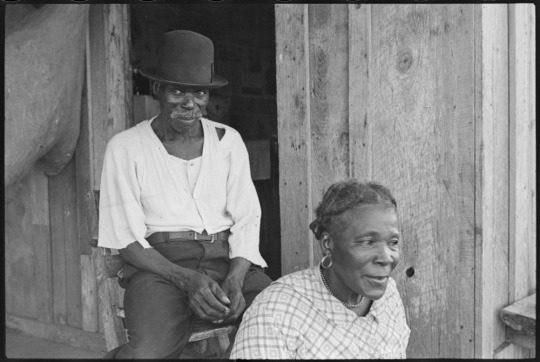
Sharecroppers, Pulaski County, Arkansas. 1937, photographer Ben by Shahn, United States Resettlement Administration, Library of Congress
Life as a Sharecropper
By design, sharecropping deprived Black farmers of economic agency or mobility. Although they were no longer legally enslaved, sharecroppers were kept in place by debt. As their income was dependent on both the profits from the sale of the crop and the whims of the landowners, sharecroppers had to find means to sustain themselves during the rest of the year. They were forced to purchase food, seed, clothing and other goods on credit, typically from a plantation “commissary” owned by the landlord.
At the end of the harvest, when revenue from the crop was “settled up,” the sharecroppers’ portion of the profits was calculated against their debts. As a result, sharecroppers often ended the year owing their landlords money. What could not be paid off was carried into the next year, creating a cycle of indebtedness that was often impossible to break.
Sharecroppers in debt to their landlord were subject to laws that tied them to the land. If they attempted to move, any new tenancy contracts they signed with other landlords could be voided by their existing ones. If they ran away, they could be brought back to their landlord in chains, and made to work as a prisoner for no pay at all.
Even if sharecroppers did not try to leave, they still faced massive obstacles in achieving any kind of solvency. For instance, many Southern states limited how and to whom sharecroppers could sell their part of the crop. In Alabama, cotton had to be sold and transported during the day, and could only be purchased by a state-defined “legitimate” merchant. As sharecroppers couldn’t afford to lose a day’s work to take their crop to market, these laws curtailed their ability to sell their product at the best possible price.
In addition, individual freedoms were crushed by tenancy contracts, many of which included arbitrary clauses forbidding alcohol consumption, speaking to other sharecroppers in the fields or allowing visitors on rented land.
Black sharecroppers could not seek redress through the political system either. Despite the ratification of the 14th and 15th Amendments, the southern “Redemption” that followed the withdrawal of Union troops from the South in 1876-7 ensured that the federal government would not enforce Black voting rights. Black elected officials disappeared from Congress and state legislatures, and attempts at organizing Black voters were brutally suppressed, as in New Orleans in July of 1866, where a convention of Black voters was attacked by a white mob under police protection that killed an estimated 200 people.
Educational opportunities were also sparse. In 1872, white Southerners pressured Congress to abolish the Freedmen's Bureau, a federal agency designed to provide food, shelter, clothing, medical services and land to newly freed African Americans. With the dissolution of the Bureau, few resources remained for the approximately 80 percent of Black people who were illiterate.
Sharecropping, with its prohibitive restrictions on physical and economic mobility, its use of violence and intimidation and its emphasis on maximum production, denied Black Southerners the ability to gain wealth, to exercise the freedom granted them by Emancipation and to gain the education they were deprived of during enslavement. The system existed, in conjunction with other institutions, to exploit Black labor at a minimum “relative loss” to white landowners while keeping the Black population underfoot.
As Black sharecropper Ed Brown said of his experience, “hard work didn’t get me nowhere.”

Sharecropper's cabin, Southeast Missouri Farms. 1938, photographer Russell Lee, Library of Congress
Sharecropping’s Decline and Legacy
After dominating the southern agricultural economy for decades, sharecropping was, like most other farming practices, upended by the rise of new technologies. While these changes were delayed by the Great Depression, sharecropping had become obsolete in many areas of the South by the mid-twentieth century. With increased mechanization, white planters’ demand for Black labor dried up.
Also during this time, Jim Crow obstructions to Black enfranchisement, as well as state-sanctioned violence against Black people, were directly challenged by the Civil Rights Movement and the landmark legislation it helped enact. The Civil Rights Acts of 1964 and 1968 and the Voting Rights Act of 1965 deconstructed de jure segregation across the South in housing and public accommodation, while empowering the federal government to secure the right to vote for Black Southerners.
As scholars Paru Shah and Robert S. Smith note, enfranchisement, desegregation and the decline of sharecropping weakened “the broader agenda of White Supremacy to crush African American socioeconomic mobility,” but did not destroy it. The effects of centuries of Black economic and social oppression, represented in part by sharecropping, are still felt today. Limited access to capital, to mobility, and to representation during Jim Crow and before it denied Black Americans the ability to save, invest or accumulate wealth, concentrating inherited fortunes in the hands of white families and shaping the present class makeup.
For nearly a century, sharecropping defined Southern agriculture and hindered Black economic advancement. The system reflected a multidude of attempts by the white power structure to keep Black workers stagnant, achieving this through intimidation, physical violence and exploitation. Ultimately, aided by organized action, shifting technological and economic conditions and the determination of sharecroppers themselves, the oppressive reality of sharecropping ended. But in the endemic inequities of American political and economic life, its legacy persists.
#NOVA | PBS#Sharecropping#Slavery Rerouted#Black Southerners#The Harvest#Integration#Mississippi's Schools#Jared Tetreau#Article#White Folks | Possessor of Courts | Guns | Railroads | Telegraph Wires | Newspapers | Money | Land#Marshall County | Mississippi#Cooper Hughes | Charles Roberts#Landowner | I.G. Bailey#Sharecropper | Ignorence | Poverty | Empty Hands#African Americans#Civil War#Confederate Monetary System#Doug Blackmon#Emancipation#Historian | Wesley Allen Riddle#Union General Carl Schurz#Southern States | Alabama#Redemption#Educational Opportunities#Freedmen's Bureau#Black Sharecropper | Ed Brown#Civil Rights Movement#Civil Rights Acts of 1964 & 1968 | Voting Rights Act of 1965#Scholars: Paru Shah | Robert S. Smith
2 notes
·
View notes
Photo

(Part of the Crews AUs series) | ISS Enterprise crew, TOS Mirror
The ISS Enterprise senior crew and additional officers by 2267.
“Where no one has conquered before”
Ship’s Name: I.S.S. Enterprise
Ship’s Registry: NCC-1701
Command History: Captain Robert April (2245-2250)
Captain Christopher Pike (2250-2265)
Captain James T. Kirk (2265-PRESENT)
Ship’s Class: Constitution Class
Ship’s Type: Heavy Cruiser
Ship’s Overview: The flagship and pride of the Imperial Starfleet, its mission to conquer and submit new civilizations for the dominance of the Terran Empire.
Ship’s Service History, abridged: _
<< unavailable data >>
Status: Active (2267)
Timeline Name: Mirror Universe
Timeline Details: Terran Empire, repressive government, in place of United Federation of Planets. Same people as prime universe, good characteristics swapped for morally bad one (and vice versa).
Annotations: This parallel universe coexists with the prime universe in the same space, but on another dimensional plane.
Superiors who fail to follow the rules of the Empire can be killed by other officers looking for promotions. Torture is a common form of interrogation, discipline and punishment.
Encounter date: ---
Encounter location: ---
Encounter cause: ---
Crew complement: 418 (430)
Crew manifest: _
Commanding officer: Captain James T. Kirk
First officer and Chief science officer: Commander Spock
Chief engineer: Lieutenant Commander Montgomery Scott
Chief medical officer: Lieutenant Commander Leonard McCoy
Chief communications officer: Lieutenant Nyota Uhura
Science officer: Lieutenant Marlena Moreau
Senior helmsman and Chief of security: Lieutenant Hikaru Sulu
Chief Navigator: Ensign Pavel Chekov
Captain's personal guard: Crewman Farrell
Transporter chief: Lieutenant Winston Kyle
Security guard: Crewman Wilson
Security officer: Ensign Davis
———————————————————————————————
All the characters shown have appeared in the episode (duh!) but positions, on top of the names of two, aren't strictly canon.
There is no official motto for the ISS Enterprise. I decided to modify the classic intro into one that would fit for the Empire.
The tv show uses the old Stardate method. No specific stardate is offered, besides the year.
In some renderings, the Terran Empire emblem is added on the hull. On the I.S.S Enterprise, as we see it in both the original and the CGI-remade episode, the emblem is missing. I decided to stick with the canon.
———————————————————————————————
Tec stuffs (aka Behind The Manip)
Not satisfied. Everything looks better with the AOS colors (gray background). Also, working with characters taken from screencaps is a big no-no in my house.
Credits
Don't own anything on this. Some text about the Mirror Verse lifted from Memory Alpha's pages about the Mirror Verse and the Terran Empire.
———————————————————————————————
Crossposted
Livejournal: prue84.livejournal.com/97704.html
Dreamwidth: prue84.dreamwidth.org/89166.html"
Deviantart: deviantart.com/prue84/art/Star-trek-edits-TOS-Mirror-crew-959268252
#Star Trek#1.5 (mirror!TOS)#James Kirk#Spock#Montgomery Scott#Leonard McCoy#Nyota Uhura#Hikaru Sulu#Pavel Chekov#Series: Trek crews AUs#Edits#||#uss enterprise#iss enterprise#star trek tos#terran empire#Star Trek Mirror Universe#mirror universe#the original series
6 notes
·
View notes